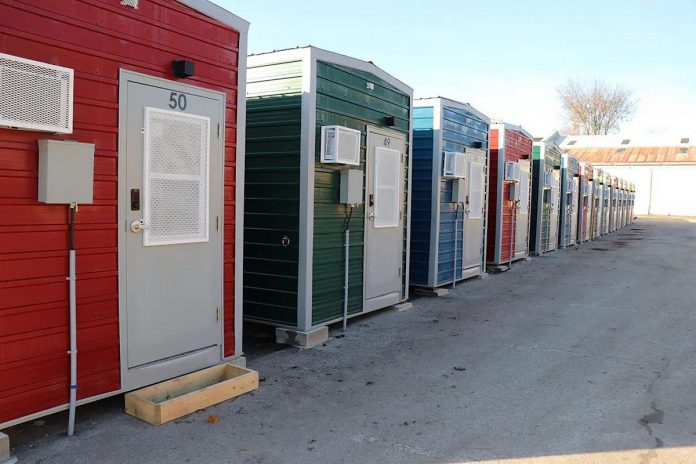
At its first meeting of the new year, Peterborough city council will be asked to consider a staff report seeking approval to expand the modular bridge housing community at Wolfe Street by up to 16 more cabins, if the city is successful in applying for two newly announced provincial programs intended to address homelessness and expand housing capacity.
The report from community services commissioner Sheldon Laidman will be presented to council meeting as general committee at 6 p.m. on Monday (January 6), and will be followed by a special city council meeting to provide final approval of the decision should general committee endorse the report.
The staff report and the special council meeting come after city staff received information on December 13 from the Ontario Ministry of Municipal Affairs and Housing about two newly announced funding programs — the Encampment Response Initiative and the Last Mile Funding Program — which have business case submission deadlines of January 3 and January 10 respectively.
Given the tight deadline for the business case submissions, city staff will be submitting a business case for the Encampment Response Initiative on January 3 and, if council approves the staff report, will submit a second business case for the Last Mile Funding Program on January 10. If council does not approve the staff report, city staff will inform the ministry to withdraw the Encampment Response initiative application and will not proceed with the business case for the Last Mile Funding Program.
The two new programs followed Premier Doug Ford’s announcement on December 12 that the Ontario government was introducing a suite of measures to help municipalities “address and dismantle” homeless encampments around the province, including steep fines for people who use drugs in public spaces. As part of the announcement, Ford announced the province would be investing $75.5 million to further support homelessness prevention and provide people living in encampments with access to reasonable alternative accommodation.
According to the staff report, the Encampment Response Initiative will provide municipalities with funding to expand shelter capacity and develop temporary accommodations for people living in encampments. Eligible uses of the funding include constructing temporary structures such as tiny cabins, covering operational costs for shelters, and remediating encampment sites.
The Last Mile Funding Program will accelerate the completion of near-ready affordable housing projects, with a priority on projects that demonstrate value for money and align with the Canada-Ontario Community Housing Initiative (COCHI) guidelines. To qualify, projects must be commitment and shovel-ready with construction to begin within 120 days of the signing of the agreement.
On September 16, city staff had presented a report to general committee that, in part, had requested that up to $1.12 million be drawn from the city’s social services reserve to expand the modular bridge housing community by up to 16 more cabins.
While general committee approved several elements of the report, including that the modular bridge housing community be extended past its original November 2025 timeframe and remain at the Wolfe Street location, council deferred a decision on spending additional funds to expand the site.
Given the potential of funding under the two new provincial programs, city staff are asking council to reconsider its earlier decision to defer expanding the modular bridge housing community and provide approval to proceed if the additional provincial funding is secured.
Each business case submitted to the province will include a request for the funding to install and set up up to 16 modular housing units at Wolfe Street, with the business case for Encampment Response Initiative also including costs related to the cleanup of encampments and transportation for people leaving encampments. The total funding request to the province will be $1,343,450, which must be used by March 31.
The staff report notes that the additional funding “comes with enhanced reporting and accountability requirements,” including municipalities demonstrating how the funds have been used to meet provincial objectives.
“The City of Peterborough’s participation in the Encampment Response Initiative and the Last Mile Funding Program represents an opportunity to address homelessness and expedite affordable housing projects,” the staff report states. “These programs align with provincial priorities to provide safe, stable housing and providing alternative options for individuals who are in encampments.”
“By leveraging targeted funding for temporary accommodations, site remediation, and affordable housing options, such as the modular housing units at 210 Wolfe Street, the city can address urgent needs and support long-term solutions. With these proactive business case submissions and council’s approval to pursue this funding, the city demonstrates its commitment to achieving sustainable outcomes for residents experiencing homelessness.”


























